Environmental conditions during perinatal development such as maternal undernutrition, maternal glucocorticoids, placental insufficiency, and maternal sodium overload can program changes in renal Na excretion leading to hypertension. Experimental studies indicate that fetal exposure to an adverse maternal environment may reduce glomerular filtration rate by decreasing the surface area of the glomerular capillaries. Moreover, fetal responses to environmental insults during early life that contribute to the development of hypertension may include increased expression of tubular apical or basolateral membrane Na transporters and increased production of renal superoxide leading to enhanced Na reabsorption. This review will address the role of these potential renal mechanisms in the fetal programming of hypertension in experimental models induced by maternal undernutrition, fetal exposure to glucocorticoids, placental insufficiency, and maternal sodium overload in the rat.
How to translate text using browser tools
13 November 2013
How the Kidney Is Impacted by the Perinatal Maternal Environment to Develop Hypertension
Ana D. Paixão,
Barbara T. Alexander
ACCESS THE FULL ARTICLE

Biology of Reproduction
Vol. 89 • No. 6
December 2013
Vol. 89 • No. 6
December 2013
developmental origins of health and disease
HYPERTENSION
intrauterine growth restriction (IUGR)
kidney
oxidative stress




